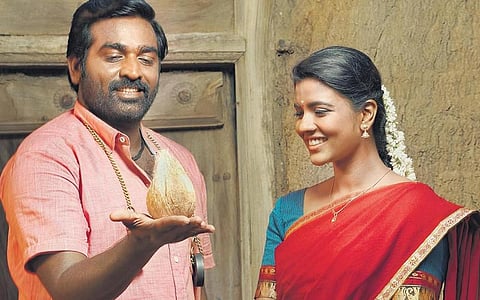
- Reviews
- Power List 2024
- Cannes 2024
- In-Depth Stories
- Web Stories
- News
- FC Lists
- Interviews
- Features
- FC SpecialsFC Specials

Over the years, our testosterone-driven film industry has manipulated and objectified the heroine through many preconceived yardsticks that have become acceptable definitions of feminine representation. The fair and alluring beauty. The demure damsel in distress waiting for her knight in shining armour. The epitome of goodness. The other woman intent on breaking up a perfect family. And in countless instances, a gyrating eye candy on the arms of a leading man. But with time, a heightened awareness of women's rights and issues in society has given way to a more sensitised space in cinema for filmmakers to create content that showcases leading ladies beyond the stereotypically accepted tropes of femininity. It is a shattering of the glass ceiling, so to speak, and Aishwarya Rajesh in P Virumaandi's Ka Pae Ranasingam embodies every bit of this change with her portrayal of Ariyanachi.
Ka Pae Ranasingam follows the travails of a young wife in a village, Ariyanachi, whose world comes crashing down when she learns of her husband Ranasingam's (Vijay Sethupathi) tragic demise following a fatal oil rig accident in Dubai. Even as she processes this mind-numbing reality and prepares for the funeral, she is thrown into a quagmire of corruption and red-tapism that sends her running endlessly from pillar to post in an effort to reclaim her dead husband's body. Consoling and supporting Ranasingam's bereaved family, Ariyanachi counters every obstacle thrown her way with a steely grit and a resolve to get justice. There are so many layers to this beautifully etched protagonist that strike a strong chord, making her one of the best written female characters in recent times with Aishwarya Rajesh turning in an organic, soul-stirring performance.
While Ariyanachi is a rural girl with simple core values, she is educated and well informed. She possesses a fiery persona coupled with a razor-sharp tongue that she uses intelligently and with integrity. Not one to be fooled, she does not shy away from questioning and confronting issues that she believes to be wrong or immoral. Though completely smitten by Ranasingam, she is seldom coy or meek, and challenges him on various occasions during their courtship. She has strong but fair opinions that she expresses at every juncture without remorse. And we love a woman who can speak her mind, don't we! The exchanges that director Virumaandi creates between Ariyanachi and Ranasingam are a breath of fresh air in that they establish an atmosphere of equality and mutual respect between husband and wife while imbuing the narrative with the qualities of a traditionally charming romance.
Ariyanachi is unwavering in her love and support for her biological and chosen family. She urges Ranasingam to forgo his political protests and instead look after the needs of his loved ones who are dependent on him to make ends meet. During Ranasingam's stint in Dubai, we see the competence with which Ariyanachi takes over the reins of the household and finances, and invests immense concern in caring for the members of his family without bias or expectation. Yet, in living for and empathising with others, Ariyanachi holds on firmly to her strong sense of self-worth, never once descending into the trap of parochial servitude. Virumaandi's impressive depiction of the protagonist's pride and confidence in her abilities leads her to be immensely appreciated by the whole village community.
Ariyanachi is a shining example of a woman who is steeped in tradition but has a broad-minded outlook towards life. Through different threads of the narrative, we see this aspect of her character play out and take on deep relevance and meaning. She believes that while rituals are important, they cannot supersede the practicalities of life. This is evident in an emotional scene where she tells her sister-in-law (Bhavani Sre) that life without Ranasingam must go on with or without the religious finalities that are expected to be performed during a death. It is a scene that underlines the innate wisdom Ariyanachi possesses about the hard realities of life.
There is an anonymous quote that I came across and it goes like this: "Wear your tragedy as an armour, not as shackles". As Ariyanachi navigates the biggest tragedy in her life, she dons her inner strength and resolve as her armour and shield, and dives headlong into battle. She doesn't scream, rant or rage at the atrocities that deter her goal. Instead, she wears the forces down through her quietly controlled vulnerability and a simmering relentless anger that flickers within her like a slow burning flame proving that a woman's greatest strength is her ability to use her head over her heart even in the face of insurmountable calamity.
Ariyanachi is unique and unforgettable not just for her courage in adversity but in her resolve to challenge the hypocrisies of systemic patriarchy while redefining the ideals of feminism. Yes, a woman can embrace and uphold tradition while nurturing progressive thought. She can be a loving wife and a dutiful daughter-in-law without falling down the rabbit hole of subservience. She can compromise and sacrifice, and yet be a leader to look up to. She can show strength and ignite a revolution through her silent but constant presence and perseverance. She can confront tragedy bravely and not helplessly. She can empower not by demeaning or hating men, but by seeking to change their perceptions and those of the society on the stereotypes of an "ideal woman". P Virumaandi and Aishwarya Rajesh, take a bow. Ariyanachi is a rockstar.